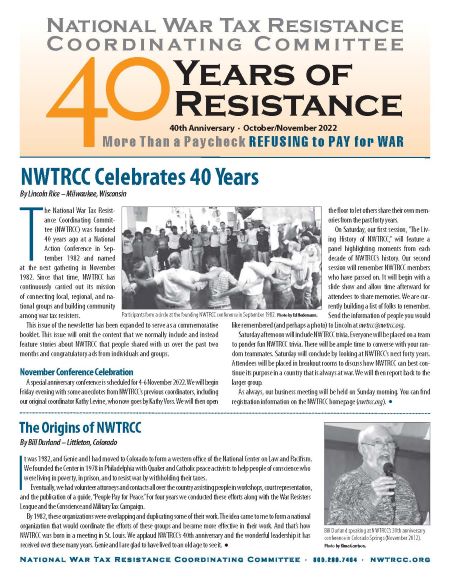
National War Tax Resistance Coordinating Committee
40 Years of Resistance
More Than a Paycheck,
REFUSING to PAY for WAR
October – November 2022
Contents
- NWTRCC Celebrates 40 Years
By Lincoln Rice-Milwaukee, Wisconsin - The Origins of NWTRCC By Bill Durland-Littleton, Colorado
- Early Memories: NWTRCC‘s First Coordinators by Larry Bassett-Lynchburg, Virginia • Early NWTRCC Meetings and Folks from All Over by Ruth Benn-Brooklyn, New York
- 1980s and 1990s: NWTRCC was a Phone Call Away by Sue Barnhart-Eugene, Oregon • Finding NWTRCC in College by Tana-Portland, Oregon
- 1990s: Finding NWTRCC at the School of the Americas by Chrissy Kirchhoefer-St Louis, Missouri • The Complexity of War Tax Resistance by Shulamith Eagle-Vermont • Halloween in Birmingham by Tana and Susan
- 2000s: Strategizing and Song by Karl Meyer-Nashville, Tennessee • NWTRCC Meetings Lead to Calling as a Therapist by Betty Winkler-New York City • Stories from the Road by Jim Stockwell-Micaville, North Carolina • Modern Day Heros by Daniel Woodham-Kingston, New York
- 2010s: NWTRCC as a Source of Support by Ariel Rosenberg-Philadelphia, Pennsylvania • Meeting my Husband, New Friends, and Skits by Susan Miller-Heston, Kansas and New York City
Click here to download a PDF of the October/November issue
NWTRCC Celebrates 40 Years
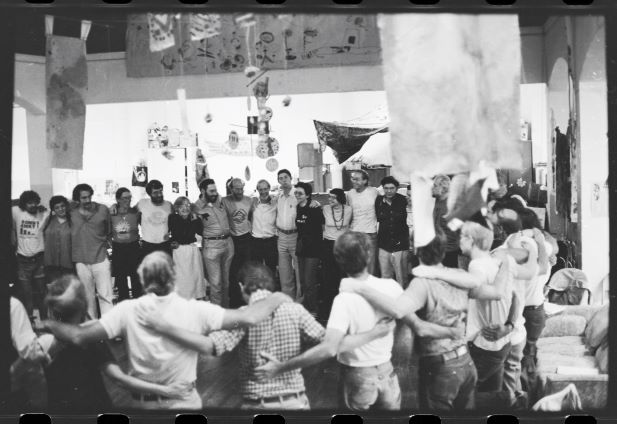
Participants form a circle at the founding NWTRCC conference in September 1982. Photo by Ed Hedemann
By Lincoln Rice-Milwaukee, Wisconsin
The National War Tax Resistance Coordinating Committee (NWTRCC) was founded 40 years ago at a National Action Conference in September 1982 and named at the next gathering in November 1982. Since that time, NWTRCC has continuously carried out its mission of connecting local, regional, and national groups and building community among war tax resisters.
This issue of the newsletter has been expanded to serve as a commemorative booklet. This issue will omit the content that we normally include and instead feature stories about NWTRCC that people shared with us over the past two months and congratulatory ads from individuals and groups.
November Conference Celebration
A special anniversary conference is scheduled for 4-6 November 2022. We will begin Friday evening with some anecdotes from NWTRCC’s previous coordinators, including our original coordinator Kathy Levine, who now goes by Kathy Voss. We will then open the floor to let others share their own memories from the past forty years.
On Saturday, our first session, “The Living History of NWTRCC,” will feature a panel highlighting moments from each decade of NWTRCC’s history. Our second session will remember NWTRCC members who have passed on. It will begin with a slide show and allow time afterward for attendees to share memories. We are currently building a list of folks to remember. Send the information of people you would like remembered (and perhaps a photo) to Lincoln at nwtrcc@nwtrcc.org.
Saturday afternoon will include NWTRCC trivia. Everyone will be placed on a team to ponder fun NWTRCC trivia. There will be ample time to converse with your random teammates. Saturday will conclude by looking at NWTRCC’s next forty years. Attendees will be placed in breakout rooms to discuss how NWTRCC can best continue its purpose in a country that is always at war. We will then report back to the larger group.
As always, our business meeting will be held on Sunday morning. You can find registration information on the NWTRCC homepage (nwtrcc.org).
.[Return to List of Headlines]
The Origins of NWTRCC
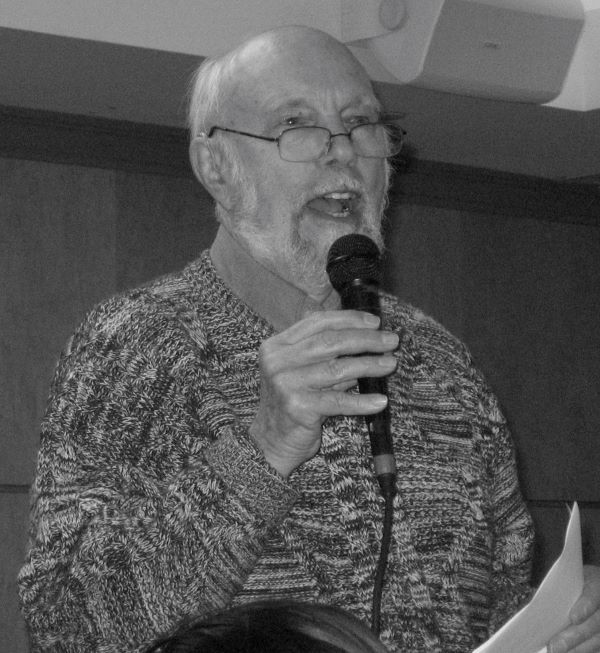
Bill Durland speaking at NWTRCC’s 30th anniversary conference in Colorado Springs (November 2012) Photo by Kima Garrison
By Bill Durland-Littleton, Colorado
It was 1982, and Genie and I had moved to Colorado to form a western office of the National Center on Law and Pacifism. We founded the Center in 1978 in Philadelphia with Quaker and Catholic peace activists t0 help people of conscience who were living in poverty, in prison, and to resist war by withholding their taxes.
Eventually, we had volunteer attorneys and contacts all over the country assisting people in workshops, court representation, and the publication of a guide, “People Pay for Peace.” For four years we conducted these efforts along with the War Resisters League and the Conscience and Military Tax Campaign.
By 1982, these organizations were overlapping and duplicating some of their work. The idea cane to me to form a national organization that would coordinate the efforts of these groups and become more effective in their work. And that’s how NWTRCC was born in a meeting in St Louis. We applaud NWTRCC‘s 40th anniversary and the wonderful leadership it has received over these many years. Genie and I are glad to have lived to an old age to see it.
Early Memories:
NWTRCC‘s First Coordinators
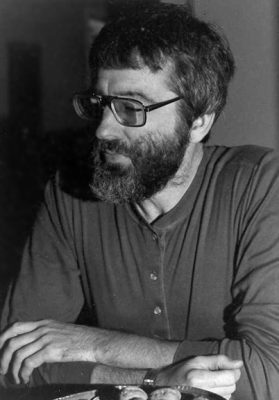
Larry Bassett in 1985. Photo by Ed Hedemann
By Larry Bassett – Lynchburg, Virginia
Kathy Levine and I moved from Virginia to Long Island to work for the Conscience & Military Tax Campaign (CMTC) in the early 1980s. We moved along with her two kids and our wood stove. We both put in a lot of time and didn’t punch a clock. The office was in the backyard garage of the house we lived in in Bellport on the south shore on the great South Bay with Fire Island across the water.
Occasionally in the winter the bay froze and we could walk out to Fire Island. Kathy also was an avid organic gardener and spent a lot of time tending a garden nearby that provided a good deal of the food for us. We hauled horse manure and eel grass regularly for the garden. She planted winter wheat once for a winter cover crop and we ended up harvesting it and grinding to make homemade whole wheat bread. Kathy is still a farmer today at her home in Hawaii.
Kathy applied for and was hired to be the first coordinator for NWTRCC. We left CMTC and later, after we had moved to East Patchogue, I joined her as the co-coordinator. We worked out of the house that we rented and one of the major projects at that time was a legal manual. Kathy worked a good deal with Vicky Metcalf to create that resource. I stood at a copy machine many hours printing copies of the manual. And when Kathy and I split up, she continued with NWTRCC for a while until a new coordinator was hired and the office moved to the Pacific Northwest.
We enjoyed doing a little traveling for NWTRCC conferences in Los Angeles and Austin and Colorado. Seeing a little bit of the country was one of the perks of the job. It was during my time working for NWTRCC that I had my 1985 adventure with the Justice Department and the Brooklyn federal district court and Judge Weinstein, who dismissed the case against me, finding in my favor and establishing a precedent for refusing to provide information about assets to the IRS. With that victory I blew my best opportunity so far to end up in jail for civil disobedience. That eight months in 1985 was probably more stressful than my current adventures with the IRS refusing to pay $250,000 for my $1 million 2016 inheritance and my current debt to the IRS of over $300,000. I continue to hope that people will watch the documentary film The Pacifist, still available on Amazon.
Early NWTRCC Meetings & Folks from All Over
By Ruth Benn – Brooklyn, New York
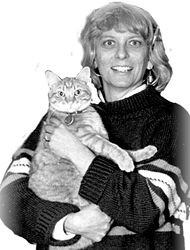
Ruth Benn while she was a staff member of War Resisters League. Photo by Ed Hedemann
In 1987, I had been on War Resisters League (WRL) staff for about a month when the war tax resistance piece of my program work sent me off to Santa Fe, New Mexico. At that time, NWTRCC meetings were mostly composed of organizational representatives, and WRL was a key member of the coalition. I met such wonderful people there, including dedicated peace activist Dorie Bunting, who just turned 100.
Since then, I’ve served terms on the Administrative Committee, spent 15 years as NWTRCC coordinator, and now participate as an individual WTR. It’s impossible to pick one story that stands out. I just feel so lucky to have been able to travel the country and meet so many amazing people.
Living in NYC and being active with WRL, I’ve been surrounded by many like-minded folks in a supportive, lefty environment, so I have a special place in my heart for folks like the activists in Colorado Springs who publicly resist war in one of the most militarized and military-loving places in the country and for each individual I heard from who said “I live in a small town in ____ and thought I was the only one who refused to pay taxes for war.”
Hats off to those individuals who act on their conscience even if they are the only one, and I hope that like Dorie Bunting I will hold on to my activist principles for however many years I have ahead of me.
1980’s and 1990’s
NWTRCC was a Phone Call Away
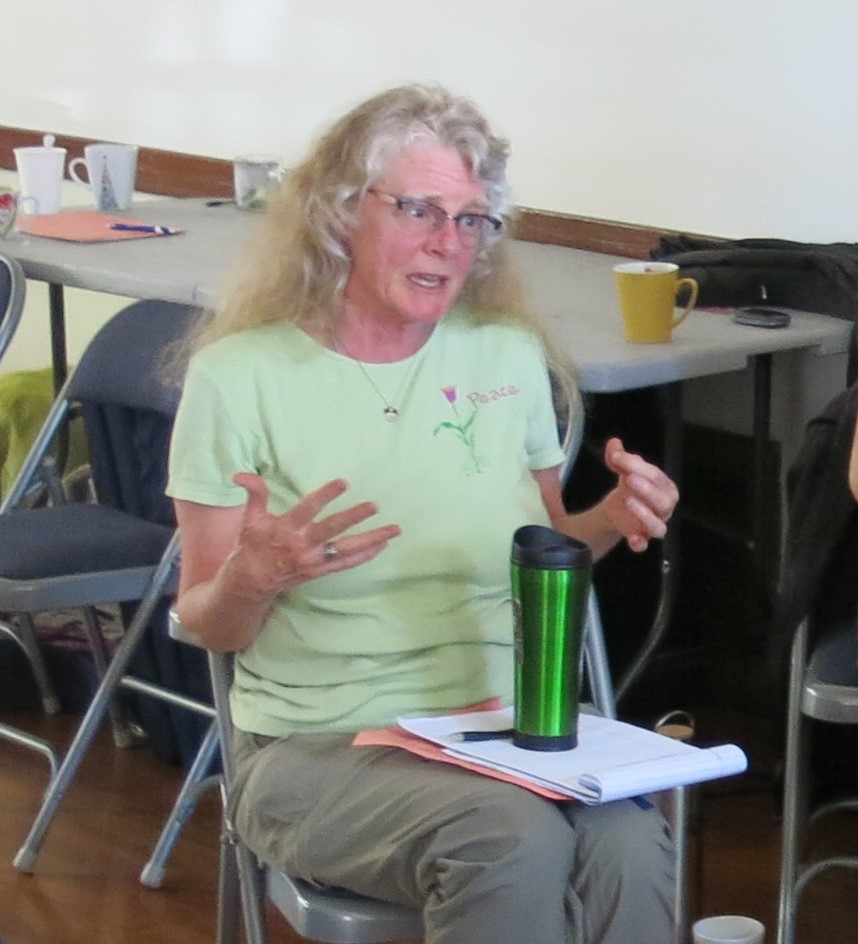
Sue Barnhart at NWTRCC gathering in Los Angeles (May 2018). Photo by Ruth Benn
By Sue Barnhart – Eugene, Oregon
I have read every edition of the newsletter cover to cover since I started subscribing to it in the 1980’s. It helps me feel connected to other war tax resisters and gives a lot of great information.
My grandmother, who was a thrifty working class woman set up a bank account for each of her grandchildren and put a dollar or two a month in it. When we turned 18, she gave it to us. I hadn’t touched it since then and that was back when bank accounts actually earned some interest. It had grown to about $800 in 1988 when the IRS placed a levy on it. That was the first time that had happened and my heart was pounding. I called NWTRCC right away and they were so supportive and helpful.
Soon after that I met Peg Morton and Charles Gray, local war tax resisters from Eugene, Oregon. Peg and I went to the NWTRCC conference up in Seattle with some other folks from Eugene. We also went to one in California and one in Portland, Oregon, and hosted one in Eugene, Oregon.
Finding NWTRCC in College
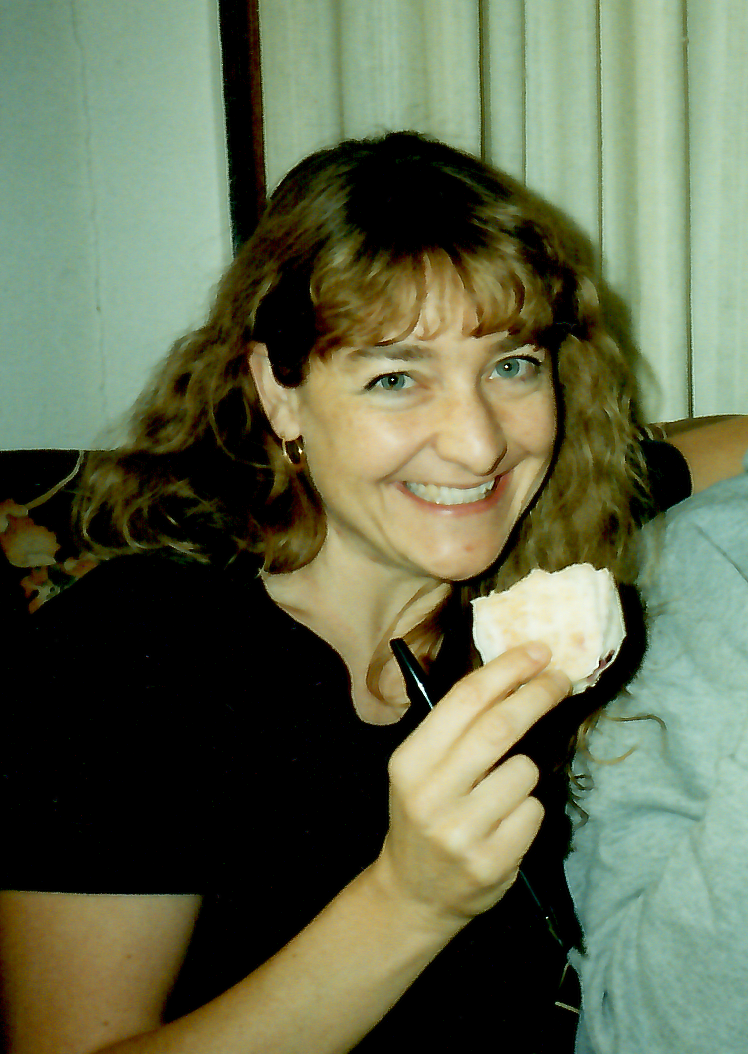
Tana enjoying a doughnut at the Milwaukee gathering (November 1999). Photo be Mary Loehr
By Tana – Portland, Oregon
In college during the 1980s, I was involved in a large protest at the Hanford Nuclear Reservation in Washington State, and was first introduced to war tax resistance by some amazing folks from the Seattle Nonviolent Action Group. They were so encouraging and supportive of the little anti-nuke group my freshman roommate and I had formed on our campus, and mentioned, “You know you don’t have to pay for this, don’t you?” Fabulous recruiting technique, there!
My first exposure to NWTRCC was a few years later, when the local Portland WTR group I had recently joined agreed to host a conference. It felt to me that we were NOT really ready for such an undertaking (then, nor in any of the subsequent years, either!), but that it ALWAYS benefitted our group to do it. The influx of new energy/inspiration/etc., plus just having to get our act together enough to accomplish it (LOL!), built momentum and carried us forward, and strengthened us, somehow.
Soon after my first meeting, I was hooked for most of the ‘90s and the ‘00s, and many of the “regulars” from that time became so dear to me. I was going to list some names, but decided against it, as this would be WAY too long, and I know I’d think of more after hitting “send”! Those of you who went to multiple meetings in that time span know who you are! Sending love & so much gratitude your way, my friends!
1990’s
Finding NWTRCC at the School of the Americas
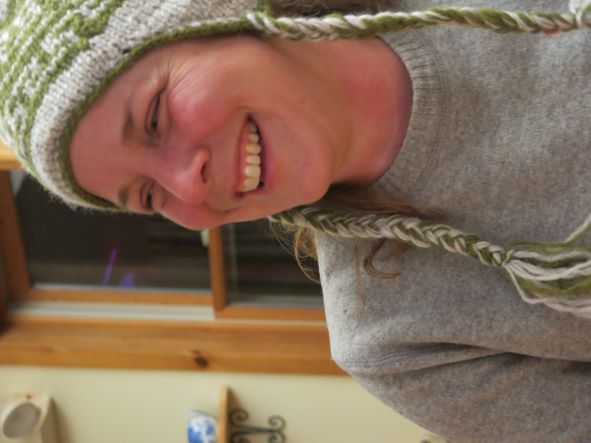
Chrissy Kirchhoefer enjoying a light moment at the NWTRCC gathering in Amherst (November 2017). Photo by Sam Koplinka Loehr
By Chrissy Kirchhoefer – St. Louis, Missouri
I first encountered war tax resistance at my first gathering at the School of the Americas Watch in November 1998. It was the first large scale peace protest in which I participated. I was awe struck by all of the amazing peace warriors, especially their joyful spirits! I wanted to learn from them and gladly accepted the information and materials they were handing out.
I visited NWTRCC’s table and gathered literature on how to become a WTR. While at the gathering, I got to better know the Columbia Catholic Workers who hosted a hospitality space in the apartments along the main road outside of Fort Benning. When I returned home to Columbia, Missouri, I decided I would quit my job and move into the Catholic Worker while finishing my last semester in college.
It was there that my education of what I wanted to do with my life really flourished! I learned why the Catholic Worker houses paid property taxes, encouraged those in the community to not pay federal income taxes, and overall embraced a lifestyle of voluntary simplicity and sharing resources.
I was exposed to a rich history of peace, justice, and labor struggles—all with a heaping dose of joy, laughter and community. It was also at this time that my commitment to anti-militarism work took deeper root. While going to my social work classes, I would encounter guests from the Catholic Worker, largely Vietnam vets who struggled with mental health and substance use issues, going through the trash to collect aluminum cans for cash. It was such a stark contrast!
The Complexity of War Tax Resistance
By Shulamith Eagle – Vermont
I became a war tax resister in 1994 or thereabouts. There had been wars hot and cold during my entire life and I was fed up with it. Then I heard about war tax resistance, and was electrified. I could do that? I could do that! Withholding the money that the government needs to make war — that would have a huge impact, if enough of us did it.
At first I kept my income low enough so I didn’t owe any taxes. Then as I aged, I needed more money, so let my income rise. Suddenly I had to pay the IRS. I did it for two or three years, but couldn’t stomach it after that. I mean this literally: it made me physically ill. So instead of a resister, I became a war tax refuser.
It was odd that during all the decades of keeping my income low, I had continued to follow the rules: I kept receipts, I kept records, I kept copies of my returns, for the obligatory seven years. When I decided to refuse to pay no matter my income, I made up my mind to refuse to cooperate in any way at all with the tax system.
I would start by cutting up all seven years of receipts and records. I dug out the box of records and a scissors. I took a receipt and then just sat there, unable to cut it in half. What in the world was going on?! The obedience to record-keeping, the fear of not complying, was so entrenched that my hands were shaking. It took some minutes to push through that and then I started cutting. Oh, the freedom of it!
Later I read in a NWTRCC publication that one should keep copies at least of tax returns so the IRS can’t make one up for you based on previous years’ income. So now I keep a digital return for each year.
It’s still a relief to forget the whole crazy business! — the insanely complicated rules, the yearly changes, the loopholes I’m not rich enough to take advantage of, the confusing instructions and densely intertwined forms…and especially the sections where they make you fill out columns of numbers and multiply them by other numbers (now show your work, children) and then if the result is below a certain number, the whole section doesn’t even apply to you — and you know it won’t because your income is never that high — yet you must figure it all out and fill it all in!
And then there’s the part where they want to know how many miles you drove in business commuting, and how many for other business needs, and how many for non-business personal use. Why do they need to know anything more than how many miles I drove for business needs? The record-keeping that 3-part question requires is onerous and I did it for decades and it’s stupid! Stupid!
Thank you for reading my rant. I feel much better now. 🙂 Anyway, at my age, life is too short to waste time doing irrelevant math. Now I fill out the return based on common sense.
I highly recommend that you do whatever is your utmost regarding not paying for war. That utmost may be helping other people who are in a better position to resist. It may mean using only legal means to resist and then paying if/when you feel you must. It may be something more challenging. However much you can do to reconcile your beliefs with your actions will change the tone of your whole life. The peace it brings is indescribable. In the words of the song: “It is well, it is well, with my soul.”
Halloween in Birmingham
[Editor’s Note: In collecting stories for this issue of the newsletter, both Tana and Susan Miller submitted memories of the Halloween 1996 gathering in Birmingham, Alabama.]
The most fun I ever had at NWTRCC conference… There were SO MANY fun (and funny) times to choose from, but this one really stands out for me: Halloween in Birmingham, Alabama. The hosting group was “two members strong, meeting daily.” That right there was a sign that it was going to be special. After our meetings we went out into the warm night, under a big moon, and visited the best of the spectacular “home-made” haunted houses. Riding in the open back of David Waters’s truck, we ended up joining a slow procession down a main drag, practicing our parade waves and enjoying the
spectacle: costumed characters on foot were weaving in and out of the makeshift parade, creating a racket and menacing those in the vehicles — and each other. What a show! Several had chain saws, and one even climbed up INTO the truck bed to terrify us with it up close! We were assured later that the chain had been removed, but it sure looked and sounded lethal. Best Halloween EVER!
– Tana
After the AdComm met in David Water’s bathroom while he multi-tasked by working on its renovation, we spent the evening participating in the Birmingham, Alabama Halloween parade. We women, including Karen, Clare, Tana, and I, learned to do the Queen’s wave and practiced it while riding down the streets in a pick-up.
– Susan Miller
Consider a Bequest
NWTRCC accepts bequests which can be arranged through your will or other estate plan.
Simply name NWTRCC as the beneficiary of a portion of your estate or of particular assets in your estate, or contact the NWTRCC office for arrangements through one of our 501c3 fiscal sponsors. A bequest costs nothing now, yet it may give you great satisfaction to know that your gift will live on in NWTRCC.
More information: nwtrcc.org/bequests, (800) 269-7464, or nwtrcc@nwtrcc.org.
2000s
Strategizing and Song
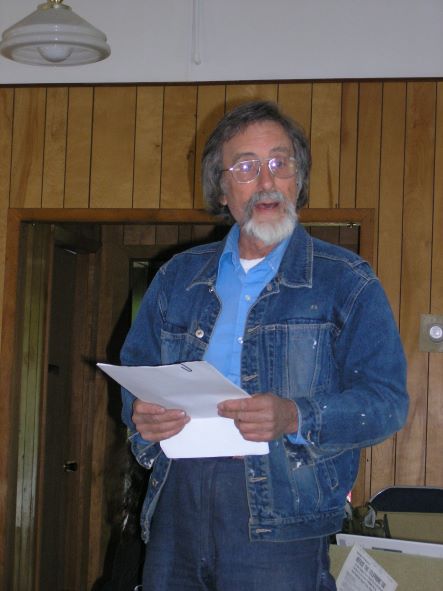
Karl Meyer singing at the NWTRCC gathering in Nashville (May 2005). Photo by Ruth Benn
By Karl Meyer – Nashville, Tennessee
2005 Strategic Planning Conference Memory
There was an October 2005 gathering in Brooklyn, at which war tax refusers stood and grouped by the decades in which they began their refusal. As I recall, Juanita Nelson and Joffre Stewart may have been the earliest refusers present, having begun in the 1940s or ‘50s decades.
Music in Nashville
At the May 2005 gathering at Nashville Greenlands, I sang my parody of “Green Eggs and Ham.” Originally written and recited for a WTR demonstration outside the Chicago IRS offices, April 15, 1975, the year the Vietnam War ended, and my fifteenth year of successfully refusing payment and collection of war taxes. These words still stand in my sixty-third year of successful WTR:
GREEN EGGS AND HAM
For fifteen years, various Internal Revenue agents have been trying to cajole, persuade, threaten or coerce me into paying taxes, even though I kept saying to them:
Listen,
I do not like to pay for arms;
I do not like to do much harm;
I do not like it Uncle Sam;
I do not like green eggs and ham.
And they say to me:
Try it, try it, just this year;
Try it, try it, have no fear;
Try it now the war is ended;
Or your judge may be offended.
Withholding makes it very easy
to still your conscience if it’s queasy.
You will like it once you pay;
You will do it every day.
Pay your tax like other folks;
We are tired of your jokes,
And I say to them:
I will not let you take my pay;
I will not stand it for a day;
I will not pay you with a check;
I will not pay this year or next;
I will not pay; I will not budge;
I will not pay them to a judge;
I will not pay them through the mails;
I will not pay them from a jail.
Sort through your tons of canvas sacks;
You will not find my income tax.
I do not like to pay for arms;
I do not like to do much harm;
I do not like it Uncle Sam;
I do not like green eggs and ham.
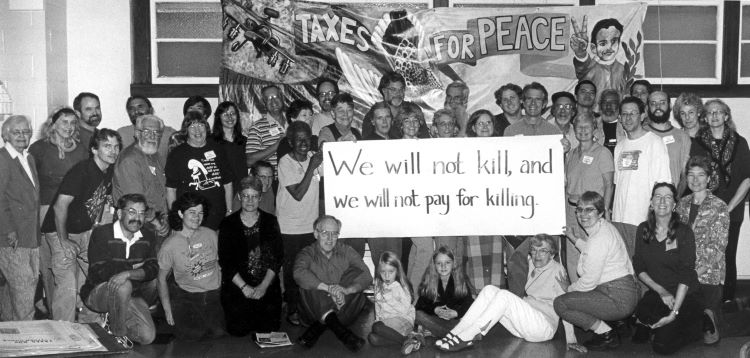
NWTRCC Meetings Lead to Calling as a Therapist
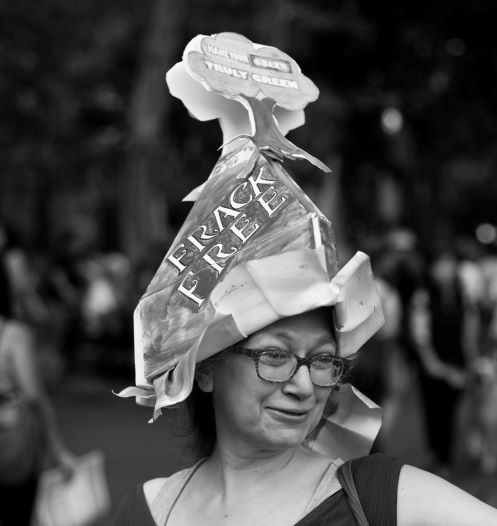
Betty Winkler at a climate march in 2014. Photo by Ed Hedemann
By Betty Winkler – New York City
Rather than write mostly about memories, I’d like to share that NWTRCC and WTR actions were factors in a decision I made about 20 years ago to become a therapist. I’d been to multiple protests and actions, with NYC-WTR and War Resisters League (WRL). It was through my contrasting these that I recognized my enjoyment of and confidence in engaging people one-on-one, that mass actions are not for me. This was very impactful for me. I did not want to shout slogans (although I sure did that), I wanted to talk with and listen to individuals regarding what they were doing to reach the goal/s they espoused.
Conversations centered on personal responsibility, control, and power—gaining it, encouraging it—major aspects of war tax resistance. These were the conversations at the NWTRCC meetings. “Why not have them on the streets and at rallies?” I thought and tried. Such elements served as a foundation for my mid-life change of career into therapist.
Sitting through NWTRCC meetings, I observed what caused discussions to become abbreviated or elongated, with regards to certain words, certain topics, certain personality types, and more. These I’ve put into practice in various relationships in my life. (I always contrasted NWTRCC meetings with those of WRL, on which I served on the Executive Committee for a number of years in the 1990s. Given NWTRCC’s focus, its meetings had more easily reached agreements.)
Sketches of NWTRCC meetings: At a Philadelphia conference, awakening in a dorm-like room to a delicious and welcoming smell, of what was homemade granola. Sleeping on the hard concrete floor of an industrial cafeteria or kitchen at a school (?), as it poured outside; this was a conference location. Driving to a meeting with Ruth (Benn), during which I got to know her beyond WTR. Light and livelies, a great way to break up and calm down meetings. Mostly, gathering with intelligent, caring people of integrity and commitment. And meeting equally caring, committed people as hosts and those I hosted.
Stories from the Road
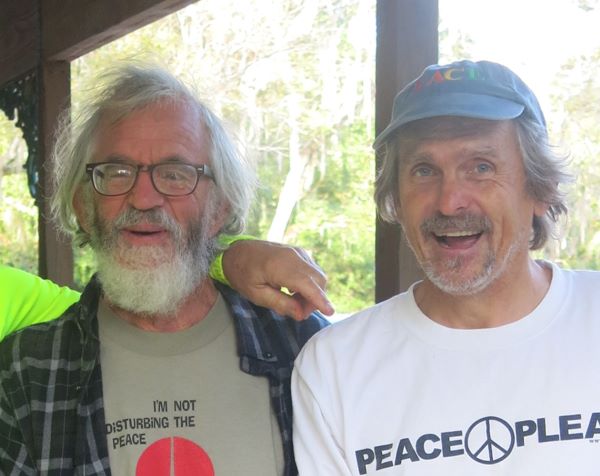
Jim Stockwell (left) and Daniel Woodham (right) at a NWTRCC gathering in Gainesville, Florida (November 2016). Photo by Ruth Benn
By Jim Stockwell – Micaville, North Carolina
Here are some stories from road trips to our pre-Covid national meetings that I made with Daniel Woodham.
On the road again to another 20-hour drive each way to be with co-resistors that so strongly believe that war is an impossible solution to solving conflict that we are willing to withhold our proportional tax dollars from the nation where we live. Here in the USA it is our Internal Revenue Service that is nominated to be the tax collector as the equalizer of our collected wealth. But it doesn’t work that way. But I digress from the road trips with Daniel.
Have you ever gotten it together to meet up with another hooligan that took off on a Halloween night for one of these road trips. Bizarre as that sounds, I cannot remember which road trip went with which gathering. Being with Daniel — and I his side kick — we egged each other on so these trips were far from boring. In fact, they were a circus.
Always at night, for we would leave his house or mine at around 10 or 11 and head out for an all-night drive till morning comes. Don’t forget to buy gas at the last gas station when you are on empty and the next station won’t be for 70 miles on back-mountain roads. OOPS! But the Honda Civic Hybrid made it. And that was only the beginning.
I believe this is when we drove all the way to Colorado Springs and on the way we picked up Susan from Kansas. We would usually pull off the highway and crash in a state park or some green space that was a delight to hang out in for a few hours. And then on the road again.
Driving during the daylight hours were spent in all kinds of conversations, travel adventures and childhood pranks, and me falling asleep. Thanks for advance planning, tight packing, and plenty of coffee and other food stuffs that kept us tripping away till we arrived at the Station, the Gathering.
Our destination to meet all our fellow resisters, some of whom are no longer with us, but must continue to carry on the Spirit and to carry on recruiting the next generation to carry the torch of WTR as a nonviolent, direct action against war. What more can we do? Enjoy the Gathering and may we do it in person sometime again.
Modern Day Heroes
By Daniel Woodham – Kingston, New York
Modern day heroes. That’s what I call many of the people that make up the NWTRCC network. Though most are unsung — no millions of dollars, nor zillion followers on Twitter, no reality TV show, no Presidential medal — they are heroes cut out of a different cloth than the popular culture recognizes. What other word than “hero” could be used when bravery, a life following conviction of non-violence, and telling the power brokers of the country, “I WON’T PAY,” are aspects of this heroism?
And Jim Stockwell is one of these. As I was trying to figure out my own WTR ways, Jim is the person who said: “I’m not one of those who says try to earn less income to do WTR! I say make as much as you can and still don’t pay!” This type of camaraderie helped me to feel less fear when facing down the IRS. Real resisters not in jail, refusing to pay for war, and giving examples with their lives of living fully, simply while minimizing their contributions for war… What awe-inspiring people!
The community that NWTRCC provides wraps us in a supportive network. Not only does it feel safer. Gatherings are always full of laughter and inspiring stories borne of people’s desire to not pay for war anymore. And thankfully we always get to engage in ethical discussions and find the space to revisit our own internal processes of doing resistance and figure out how to tweak things as we learn how others carry out their acts of conscience. Thanks NWTRCC!
2010s
NWTRCC as a Source of Support
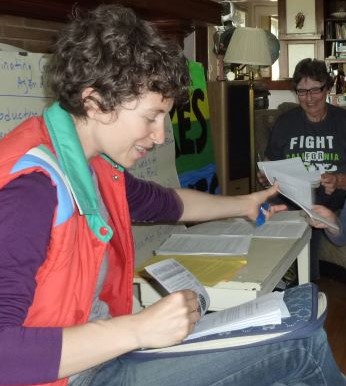
Ari Rosenberg facilitating at NWTRCC business meeting in Milwaukee (May 2015). Photo by Ed Kale
By Ariel Rosenberg – Philadelphia, Pennsylvania
NWTRCC has been an amazing support to me throughout my time as a WTR. When I was first figuring things out, Larry Dansinger connected me to Ruth Benn. Ruth not only answered my questions, but connected me to the amazing handouts that really walk new resisters through different options.
Larry and Ruth’s support helped me get through the first few years. After I moved from Maine to Philadelphia, I became more involved with NWTRCC — attending gatherings, serving on the AdComm, and getting to know more resisters.
My first gathering was in NYC and I remember feeling a bit nervous being in the company of so many people that had been involved in the movement for longer than I had been alive. I have loved hearing people’s stories of group protests and acts of solidarity and hope that one day we can be in that type of deep community together again.
Thanks to everyone that has helped shape this movement. Let’s keep it going for 40 more years.
Meeting My Husband, New Friends,
and Skits
By Susan Miller – Hesston, Kansas & New York City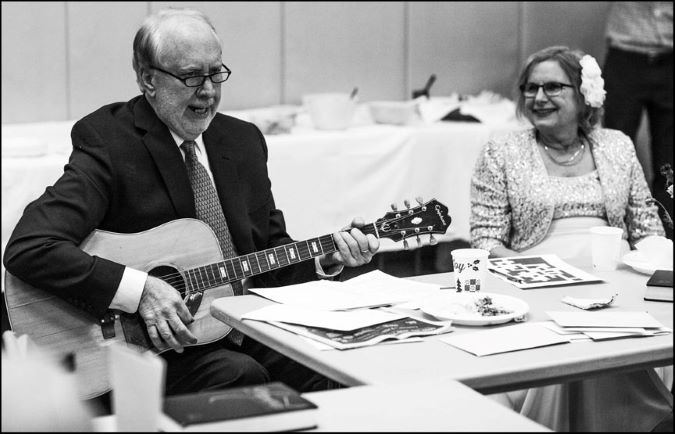
I came to New York City several days early for the 2013 NWTRCC meeting and stayed with Carla, who helped me meet my husband Mel Lehman when he gave us a “Friends and Family” bus tour. Mel gives tours to support himself and the peace work he does with Common Humanity.
At the Colorado Springs NWTRCC meeting in 2012, the local group performed skits about what “wonderful” weapons you could buy with taxes. The skits and songs they performed for us and their community could teach both toddlers and oldies about the stupidity of spending money for the military. At that same meeting we held WTR banners at all four corners of a busy intersection in what is one of the most militarized cities in the USA.
I have met so many wonderful people because of NWTRCC and my involvement in war tax resistance. For example, there was Cornelia Lien, a Canadian Mennonite who lived and worked in Newton, Kansas in the 1970s and 1980s and asked her church agency employers to refuse to turn over her income tax to the IRS. Don Kaufman, who wrote, What Belongs to Caesar? Stan Bohn and other Mennonites in our Heartland Peace Tax group.
I also met Clare (simple living), Robert (Christian faith-based wtr), Clark (my first anarchist friend), Ruth (ethical lifetime commitment), and Chrissy (who has such wonderful enthusiasm and energy for her work with NWTRCC). I name these friends at the risk of leaving out the many other inspiring persons I’ve met in person at NWTRCC meetings or through learning their stories, such as the other Susans and our trustworthy leader, Lincoln.
NWTRCC Raffle Winners!
More than a Paycheck
Editor Lincoln Rice
Production Rick Bickhart
More Than a Paycheck: Refusing to Pay for War is a bimonthly publication of the National War Tax Resistance Coordinating Committee, a clearinghouse and resource center for the conscientious war tax resistance movement in the United States. NWTRCC is a coalition of local, regional and national affiliate groups working on war tax related issues.
NWTRCC sees poverty, racism, sexism, homophobia, economic exploitation, environmental destruction and militarization of law enforcement as integrally linked with the militarism which we abhor. Through the redirection of our tax dollars, NWTRCC members contribute directly to the struggle for peace and justice for all.
Paper Subscriptions are $25 per year. Digital subscriptions are free.
NWTRCC
P.O. Box 5616, Milwaukee, WI 53205
(800) 269‒7464
(262) 399‒8217
nwtrcc@nwtrcc.org
social media: socialmedia@nwtrcc.org
newsletter: wartaxresister@nwtrcc.org
www.nwtrcc.org
